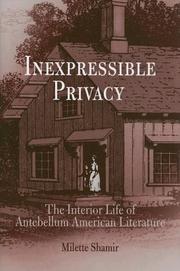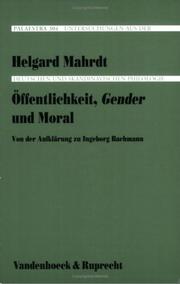| Listing 1 - 10 of 31 | << page >> |
Sort by
|
Book
ISBN: 0300156642 9780300156645 9780300155419 0300155417 Year: 2013 Publisher: New Haven Yale University Press
Abstract | Keywords | Export | Availability | Bookmark
 Loading...
Loading...Choose an application
- Reference Manager
- EndNote
- RefWorks (Direct export to RefWorks)
Spanning nearly 500 years of cultural and social history, this book examines the ways that literature and surveillance have developed together, as kindred modern practices. As ideas about personhood-what constitutes a self-have changed over time, so too have ideas about how to represent, shape, or invade the self. The authors show that, since the Renaissance, changes in observation strategies have driven innovations in literature; literature, in turn, has provided a laboratory and forum for the way we think about surveillance and privacy. Ultimately, they contend that the habits of mind cultivated by literature make rational and self-aware participation in contemporary surveillance environments possible. In a society increasingly dominated by interlocking surveillance systems, these habits of mind are consequently necessary for fully realized liberal citizenship.
Self in literature. --- Privacy in literature. --- Citizenship in literature.
Book
ISBN: 1611480019 9781611480016 9780838758168 0838758169 9781611480009 1611480000 1322064814 Year: 2011 Publisher: Lewisburg [Pa.] Lanham, Md. Bucknell University Press Rowman & Littlefield
Abstract | Keywords | Export | Availability | Bookmark
 Loading...
Loading...Choose an application
- Reference Manager
- EndNote
- RefWorks (Direct export to RefWorks)
Ambivalent Desires is a literary and cultural study of the reception of modernity in Colombia. Unlike previous studies of Latin American modernization, which have usually focused on the public aspect of the process, this book discusses the intersection between modernity and the private sphere.
Colombian literature --- Modernism (Literature) --- Privacy in literature. --- Crepuscolarismo --- Literary movements --- History and criticism.
Book
ISBN: 9781442669529 1442669527 9781442669536 1442669535 9781442647916 1442647914 Year: 2016 Publisher: Toronto
Abstract | Keywords | Export | Availability | Bookmark
 Loading...
Loading...Choose an application
- Reference Manager
- EndNote
- RefWorks (Direct export to RefWorks)
"For at least a generation, scholars have asserted that privacy barely existed in the early modern era. The divide between the public and private was vague, they say, and the concept, if it was acknowledged, was rarely valued. In Privacy in the Age of Shakespeare, Ronald Huebert challenges these assumptions by marshalling evidence that it was in Shakespeare's time that the idea of privacy went from a marginal notion to a desirable quality. The era of transition begins with More's Utopia (1516), in which privacy is forbidden. It ends with Milton's Paradise Lost (1667), in which privacy is a good to be celebrated. In between come Shakespeare's plays, paintings by Titian and Vermeer, devotional manuals, autobiographical journals, and the poetry of George Herbert and Robert Herrick, all of which Huebert carefully analyses in order to illuminate the dynamic and emergent nature of early modern privacy."--
English literature --- Privacy in literature. --- History and criticism. --- 1500-1700 --- Classical Period --- Early Modern Period

ISBN: 0812239067 Year: 2006 Publisher: Philadelphia University of Pennsylvania Press
Abstract | Keywords | Export | Availability | Bookmark
 Loading...
Loading...Choose an application
- Reference Manager
- EndNote
- RefWorks (Direct export to RefWorks)
Book
ISBN: 9780691241876 0691241872 9780691198231 0691198233 0691201544 Year: 2022 Publisher: Princeton Princeton University Press
Abstract | Keywords | Export | Availability | Bookmark
 Loading...
Loading...Choose an application
- Reference Manager
- EndNote
- RefWorks (Direct export to RefWorks)
Book
ISBN: 0460104292 Year: 1976 Publisher: London Dent
Abstract | Keywords | Export | Availability | Bookmark
 Loading...
Loading...Choose an application
- Reference Manager
- EndNote
- RefWorks (Direct export to RefWorks)
Jonson, Benjamin --- Jonson, Ben, --- Criticism and interpretation --- Privacy in literature --- Public opinion in literature --- Jonson, Ben --- -Criticism and interpretation --- Privacy in literature. --- Public opinion in literature. --- Criticism and interpretation. --- -Iohnson, Ben --- Johnson, Ben --- Dzhonson, Ben, --- Джонсон, Бен, --- B. J. --- J., B. --- Iohnson, Ben, --- Johnson, Ben, --- Jonson, Benjamin, --- דזשאָנסאָנ, בענ

ISBN: 3525205775 9783525205778 Year: 1998 Volume: 304 Publisher: Göttingen: Vandenhoeck und Ruprecht,
Abstract | Keywords | Export | Availability | Bookmark
 Loading...
Loading...Choose an application
- Reference Manager
- EndNote
- RefWorks (Direct export to RefWorks)
Bachmann, Ingeborg --- Gender identity in literature --- Geslachtsidentiteit in de literatuur --- Identité sexuelle dans la littérature --- Privacy in de literatuur --- Privacy in literature --- Vie privée dans la littérature --- Bachmann, Ingeborg, --- German literature --- History and criticism --- -Privacy in literature --- German literature - History and criticism
Book
ISBN: 9782406059134 9782406059141 Year: 2017 Publisher: Paris Classiques Garnier
Abstract | Keywords | Export | Availability | Bookmark
 Loading...
Loading...Choose an application
- Reference Manager
- EndNote
- RefWorks (Direct export to RefWorks)
S?il n?a pas inventé la vie privée, Horace a offert aux écrivains de la première modernité divers modes et formes d?expression pour penser le rapport complexe du privé au public à l?époque de bouleversements religieux, politique et épistémologique qui est la leur While he did not invent private life, Horace offered writers of early modernity various modes and forms of expression for thinking about the complex relationship between private and public during the time in which they lived, which was one of religious, political and epistemological upheaval
Thematology --- Psychological study of literature --- Horace --- Poets, Latin --- Privacy in literature --- Privacy --- Poètes latins --- Vie privée dans la littérature --- Vie privée --- History --- Histoire --- Poètes latins --- Vie privée dans la littérature --- Vie privée
Book
ISBN: 1421425386 9781421425382 9781421425375 1421425378 Year: 2018 Publisher: Baltimore
Abstract | Keywords | Export | Availability | Bookmark
 Loading...
Loading...Choose an application
- Reference Manager
- EndNote
- RefWorks (Direct export to RefWorks)
"Word of Mouth brings together the insights of queer and lyric theory to tell the story of how gossip modeled forms of sociality and voice that poets experimented with over the course of the twentieth century. Through a set of case studies of culturally diverse American poets--Gertrude Stein, Langston Hughes, Frank O'Hara, James Merrill, and others--who absorbed and contended with the loose talk that swirled about them and their work, the book argues that gossip became a vehicle for the performance of alternative sexualities and concomitant meditations on alternative modes of poetic practice. At the heart of this argument is a queer revaluation of modern lyric poetry. Attending to gossip's key role in modern and contemporary poetry enables a recognition of the unpredictable ways that conventional understandings of the modern lyric poem--as, for example, an utterance smudging the lines between private and public, knowing and unknowing, intimacy and strangeness--have been shaped by, and afforded a uniquely suitable space for, the expression of queer sensibilities. More than simply mapping a curious poetic mode, then, Word of Mouth contributes a crucial, and largely neglected, queer perspective to current lyric studies and its renewed scholarly debate over the practices and forms of lyric poetry. The book presents new and instructive queer contexts for understanding the influential formal achievements of Stein, Hughes, O'Hara, and Merrill, and uncovers the unexpected ways that the history of the modern lyric intertwines with histories of sexuality"--
Queer theory. --- Literature and society --- Gossip in literature. --- American poetry --- Gender identity --- History --- History and criticism. --- American poetry. --- Homosexuality and literature --- Homosexuality and literature. --- Privacy in literature. --- History and criticism --- 1900-1999. --- United States. --- Queer theory --- Gossip in literature
Book
ISBN: 9789562607940 9562607941 Year: 2016 Publisher: Santiago de Chile : Cuarto proprio,
Abstract | Keywords | Export | Availability | Bookmark
 Loading...
Loading...Choose an application
- Reference Manager
- EndNote
- RefWorks (Direct export to RefWorks)
Domestic space in literature. --- Latin American literature --- Latin American literature. --- Privacy in literature. --- Public spaces in literature. --- Women in literature. --- History and criticism --- Women authors --- History and criticism. --- Women authors. --- 1900-1999.
| Listing 1 - 10 of 31 | << page >> |
Sort by
|

 Search
Search Feedback
Feedback About UniCat
About UniCat  Help
Help News
News